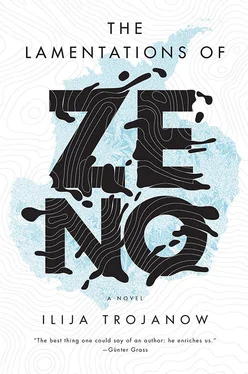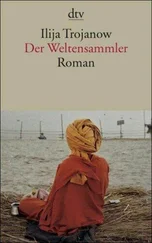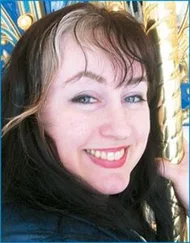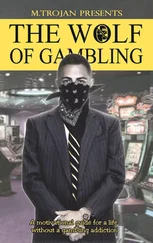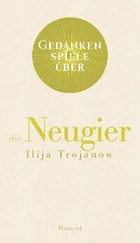
4. 51°41′37″S, 57°49′15″W
THIS TIME, TOO, it’s raining in the Falklands. Days when it doesn’t rain go into the annals, as do evenings when the darts don’t fly in the Victory Bar. Life in Stanley used to be full of unexpected danger, people could cut peat at will above the town, water would collect in the holes, until one night a mudslide sluiced into the sleeping city without waking a single dog, swallowing house after house and sweeping school and church into the harbor and suffocating a shopkeeper and two shearers. That also went into the annals. Years ago the governor let it be known that Stanley was a very British town on a very British island (cruise ship lecturers take note of such pithy remarks, they enjoy assembling such sayings for their own use). The governor merits contradicting: in actuality the islands belong to South Africa, geologically speaking (my claim), biologically they are part of South America (Beate’s view), politically they belong to Great Britain and to Great Britain alone (Margaret Thatcher’s position). The passengers bombard us with questions about the war, one of the rare wars between white men, they remember the tense evenings in front of the television. I always answer short and to the point: it was the first war in the history of the Western Hemisphere in which more humans died than animals. I have no idea if that’s true, animals seldom make it into war reports, but it does shock the passengers.
Paulina has been wanting to go on an outing. We’ve never taken a walk together on British soil. Up to now we’ve only landed on the Falklands when the trip was nearing its end, Paulina was busy taking inventory, and I was preparing the auction of memorabilia on behalf of a foundation whose mission it is to teach fishermen ways to keep their longlines from killing hundreds of thousands of albatrosses every year. But now we have a good afternoon hour all to ourselves. She puts on apple-green shoes and an oversized raincoat, which billows out in the wind like a racing sail, I have to hold her arm so she doesn’t fly away. We take off, just the two of us, in the direction of Gypsy Cove, along a waterlogged path I know that follows the windswept shore close to the water, our steps and voices startle a covey of ducks, Falkland steamer ducks, I announce with the voice of expert conviction, Paulina laughs and points to the wreck of the Lady Elizabeth .
“That’s a pretty big steamer duck right there.”
“Ok, ok, I was fibbing, in reality they’re Argentine stiff tails.”
“And I’m supposed to believe that, Professor? Don’t you go pulling my leg. And I suppose those are British boobies?”
“Certainly not, those are coots. Adult white-winged coots, I swear it.”
Her hands have found a path through the layers of wind and rain protection, past Gore-Tex and wool, and she strokes my chest with life-affirming coldness.
“You’re the one who taught me,” she says with windy seriousness, “that people who know a lot lie the most.”
“Could we agree on the word ‘invent’?”
My appeal is tendered halfheartedly, the path veers away from the shore and takes us across a low shrubby heath strewn with stones and on toward Yorke Bay (some of the passengers are headed our way, judging from the way they’re staring at us I can only imagine what they are thinking). A ranger is standing next to a wooden shelter, as though he were waiting just for us to deliver his explanations. Paulina jabs her finger in my direction and says to the ranger: “If you only knew what this evil man …”
The ranger presses his lips together and raises his eyebrows, I nip the coming irritation in the bud.
“It’s not half as bad as it sounds, we just couldn’t agree on which birds had which names.”
“You have a wonderful beach here, people must love it.”
“Yes, it’s the most beautiful beach in town.”
“And not a soul in sight, in my country it would be overflowing with romping children and passed-out parents on a friendly Saturday like this.”
“I wouldn’t advise that.”
“On account of the current?”
“Not because of the ocean, the beach itself is deadly dangerous.”
“How so?”
“It’s mined.”
“Mined?”
“Antipersonnel mines.”
“I don’t understand, the place is swarming with penguins.”
“Your question is entirely justified, ma’am, but consider that the mines require a weight of twenty kilos to explode, and even a fully grown Magellan penguin doesn’t get that big, so you may rest assured that the animals have nothing to fear.”
Paulina puts her hand to her mouth.
“Soldiers make the best animal protectors,” I say.
“It was the Argentines,” the ranger specifies.
“Just like in my country,” says Paulina, “everything looks like paradise until the bullets start whizzing past your ears.”
She laughs again, but this time it’s a different laugh, the kind she uses to wipe away something unpleasant.
“They like it here, the Magellan penguins, they dig their nest burrows in the soft peaty soil up there in the dune grass.”
“They dig their nests?”
“Yes ma’am, and they use the burrows for years, they mate for life and never separate. They pick their partners carefully and can rely on them completely.”
We listen to his lecture, and to the oyster fishermen in the background, then take our leave and head off into the blooming furze, where I pick some mouse-eared chick-weed, “not for you, Paulina, it’s for the family altar in our cabin, for all the grandmothers.” On the way back we stop at one of the fence posts that has a red sign nailed to it, at closer distance we can make out a skull and crossbones below the words “Danger Mines.”
At the counter in the reception someone left a brochure which I open in passing. “The Falkland Islands are one of the few places in the world where nature reigns supreme.” A minefield as unspoiled nature? Why not, after all, Kitzbühel counts as a climatic health resort even on holidays with bumper-to-bumper traffic jams. All El Albatros has to spare for me is contradiction. If all beaches were mined we wouldn’t have to worry about bird refuges. I listen to him with one ear, at the next table over some men are talking as they spoon their crème brûlée about the charming heather moor at Yorke Bay, ideal for a golf course, a classic links, and while they let their fantasies go teeing off I imagine how in the course of construction the location of the landmines might be forgotten. A beach like that (“a spectacular par 3 shot right over the heads of our native Magellanic penguins”) could become the ultimate sand trap, one which could rightly be billed as a bunker you might never get out of.
I’ve been watching it my entire life, with passionate care and precise instruments. And if my observations will have had no impact on my chosen field and how this field views itself, then my academic career will have been a waste. Every May and September I would go a few days ahead of my students, so I could abandon myself to my senses, undisturbed, and feel the glacier’s full emotional force before we captured its data. It was my doctoral advisor who placed this particular glacier in my care, an arranged marriage that in time became a union of love, as if every measurement were an acknowledgment of its singularity. On that first morning I rose before the sun, laced up my hiking boots which initially felt strange, and then I trekked around the glacier, ascending on the left side and then after crossing the ice descending below the escarpment on the other side. Each time I visited I would first scan the glacier with my eyes, then test it with my feet. Whenever I stopped to catch my breath I would touch it, laying my hands on its flanks and then stroking my face, taking in its icy breath, its invigorating cold. I was familiar with every one of its sounds, the creaking and the clanking, every glacier has its own voice, when I visited others I would compare theirs with the one I knew. A dying glacier sounds different than a healthy one, it gives off a powerful rattle when it bursts along a crevasse, and if you listen closely you can hear the melt flowing into the underground lakes speeding the erosion of the wrinkled body. We were like an elderly couple: one of us was severely ill, and the other couldn’t do anything about it. All terms used to describe our relationship — such as “subject of study” or “mass balance measurement”—were woefully inadequate, and no column of figures could do any more justice to my devotion than could our bookkeeping, which recorded the snowfall deposit at the end of the winter as a kind of revenue, and the degree of summer thaw as a kind of expense. These credits and debits caused me greater and greater despair, and over the years I changed into a kind of doctor who had only to look into the eyes of his patient to make the proper diagnosis. I recognized that my glacier was doomed long before the declining values of its middle layer thickness pronounced their judgment. I didn’t have to wait for the results to understand the ramifications of the sustained depletion. It was no longer possible to offset the loss. We were aging together, the glacier and I, but the glacier was well ahead of me when it came to dying.
Читать дальше
